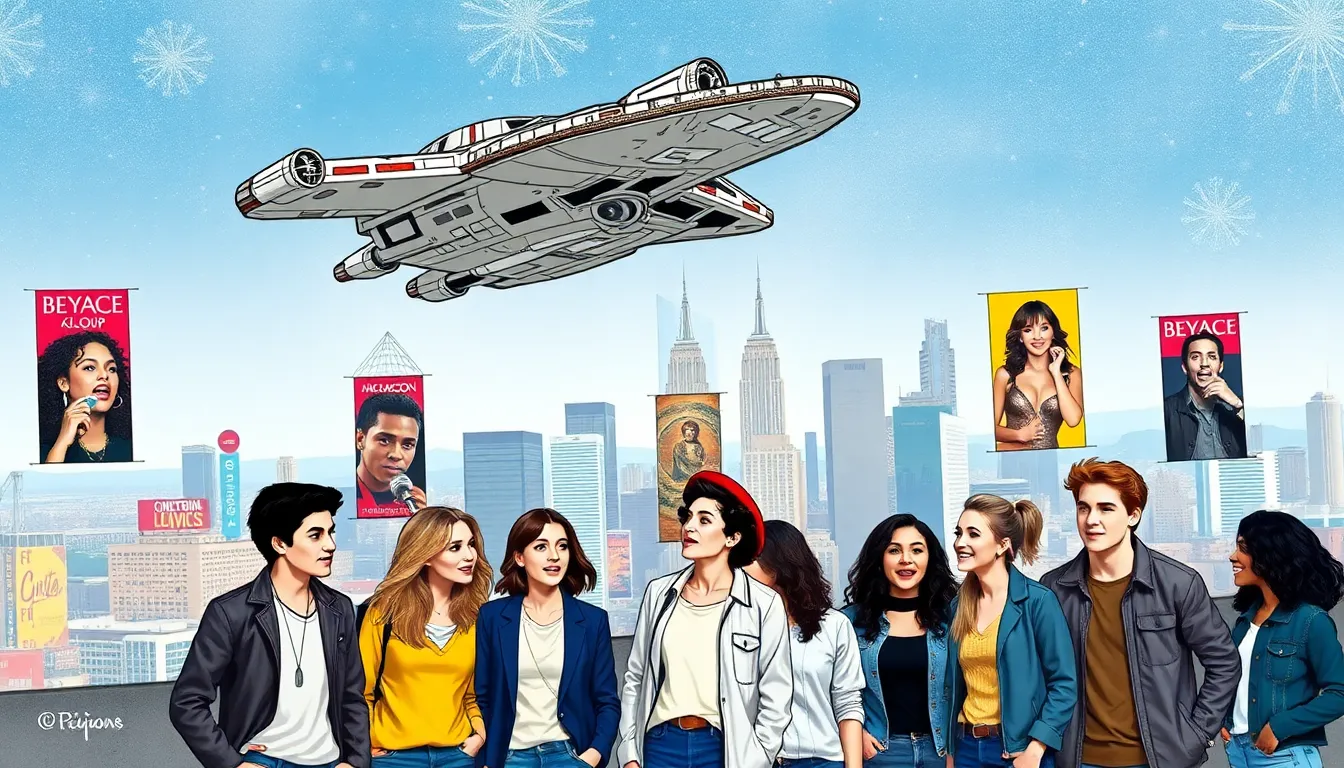Pop culture isn’t just a fleeting trend; it’s the heartbeat of society, shaping conversations and sparking creativity. From unforgettable movie lines to chart-topping hits, it’s the vibrant tapestry that colors our lives. Imagine a world without the catchy tunes of the ’80s or the iconic characters that have made us laugh, cry, and question our fashion choices.
Table of Contents
ToggleWhat Is Iconic Pop Culture?
Iconic pop culture encompasses the various elements that dominate mainstream media and trendsetting discussions. It consists of phenomena such as blockbuster movies, chart-topping songs, and trending fashion statements. These elements frequently shape societal norms and values, reflecting collective experiences.
Movies, for instance, showcase memorable scenes and quotes that resonate with audiences. The influence of films like “The Godfather” and “Star Wars” extends beyond screens into everyday language and references. Music also plays a crucial role; artists such as Beyoncé and Michael Jackson have created timeless hits that remain relevant across generations.
Television series like “Friends” and “Game of Thrones” depict cultural moments that foster connections among diverse audiences. Their characters and storylines often spark conversations and influence social dynamics. Fashion icons, too, generate major impact; outfits worn by celebrities can lead to trends, as seen with styles popularized by Rihanna and Harry Styles.
Social media platforms amplify these cultural elements, allowing immediate interaction and engagement. Viral challenges, memes, and quotes shape group identities and foster community. Pop culture often serves as a mirror, reflecting the values, struggles, and triumphs of society at large.
By acknowledging these elements, one can understand how iconic pop culture shapes and influences everyday life. Admiring memorable quotes, songs, and films fosters a deeper appreciation of cultural significance that resonates widely.
Influential Eras of Iconic Pop Culture

Pop culture evolves continuously, with distinct eras defining its most influential elements. Each decade leaves a lasting impact through music, movies, fashion, and television.
The 1950s and 1960s
Rock ‘n’ roll emerged as a defining musical genre, led by icons like Elvis Presley and Chuck Berry. Movies like “Rebel Without a Cause” portrayed youth rebellion, influencing societal attitudes. Television shows such as “I Love Lucy” introduced comedic narratives, solidifying the sitcom format. Fashion revolved around bold styles, with poodle skirts and leather jackets capturing the zeitgeist. The cultural revolution set the stage for progressive movements that shaped future generations.
The 1970s and 1980s
The disco era brought a surge of vibrant nightlife, with artists like Donna Summer and the Bee Gees topping charts. Movies like “Star Wars” created groundbreaking cinematic experiences, introducing fantasy elements into mainstream cinema. MTV debuted in 1981, forever changing how music and visuals intertwined. Fashion trends included bell-bottoms and shoulder pads, reflecting the flamboyant spirit of the times. Cultural shifts during this period laid the groundwork for later artistic expressions and societal changes.
The 1990s and 2000s
Grunge music emerged, with Nirvana and Pearl Jam challenging norms and influencing youth culture. Iconic films like “Titanic” showcased epic storytelling, while shows like “Friends” cemented the sitcom’s relevance. The rise of the internet transformed media consumption, facilitating access to pop culture phenomena. Fashion trends included cargo pants and chokers, emblematic of diverse styles. This era’s impact resonates today, creating nostalgic connections within contemporary culture.
Iconic Figures in Pop Culture
Iconic figures elevate pop culture through their influence and talent across various mediums. They shape society’s norms, inspire creativity, and leave lasting legacies.
Musicians Who Shaped a Generation
Musicians like Elvis Presley and Madonna revolutionized music with their distinctive styles. Their influence on rock and pop laid the groundwork for modern music. Beyond entertainment, artists such as Bob Marley and Kurt Cobain voiced cultural movements, embedding their messages into social consciousness. Chart-toppers like Beyoncé and Drake continue to redefine music, merging genres and addressing pressing societal issues through their lyrics. Their reach extends beyond charts, influencing fashion and social movements as they connect with fans across generations.
Actors and Actresses Who Redefined Roles
Actors such as Meryl Streep and Denzel Washington have transformed roles across decades, portraying complex characters on screen. Their powerful performances resonate with audiences and challenge industry norms. Notable figures like Robin Williams and Viola Davis brought depth to comedy and drama, earning accolades and redefining expectations for their craft. Action heroes like Bruce Willis and female leads like Sigourney Weaver have broadened the scope of character representation in Hollywood. Through their dedication, these iconic figures have elevated storytelling and highlighted diverse narratives in film.
Influential Artists and Creators
Creators like Andy Warhol and Frida Kahlo changed the landscape of visual art through unique perspectives. Their works sparked conversations and inspired later generations of artists, with themes still relevant today. Innovators such as Walt Disney revolutionized animation and storytelling, creating beloved characters like Mickey Mouse. Contemporary creators like Lin-Manuel Miranda blend diverse cultural influences, enriching the performing arts landscape. Through each creation, these talents resonate with audiences, shaping cultural dialogues and expanding the boundaries of creativity.
The Impact of Iconic Pop Culture
Iconic pop culture significantly influences society, trends, and global dynamics. Its effects resonate through various mediums, impacting individuals and communities alike.
On Society and Trends
Societal norms often reflect the themes and values present in pop culture. Popular films, music, and fashion shape individuals’ identities and ideals. Trends originating from iconic figures often spread quickly, influencing everyday fashion choices and communication styles. For instance, phrases from movies like “You talking to me?” become part of common vernacular. Music by artists like Taylor Swift sets trends that resonate with youth culture, inspiring movements like self-acceptance and identity exploration. Each new trend fosters a sense of connection, encouraging engagement among diverse groups and promoting a shared cultural experience.
On Globalization and Cultural Exchange
Globalization amplifies the reach of iconic pop culture elements worldwide. Artists, films, and fashion regularly cross borders, merging cultural identities and traditions. Social media platforms facilitate this exchange, allowing instant access to global trends and ideas. Streaming services provide platforms for international music and film, gaining widespread popularity beyond local markets. For example, K-pop’s rise illustrates how South Korean artists have captivated audiences globally, influencing fashion and beauty standards. Cultural exchange fosters appreciation for diverse perspectives, enriching societies through shared experiences and collective creativity.
Iconic pop culture serves as a mirror reflecting societal values and experiences. It connects individuals across generations through shared memories and influences daily life in profound ways. From unforgettable movie moments to chart-topping hits and trendsetting fashion, these cultural elements shape identities and foster community.
As pop culture continues to evolve, its impact remains undeniable. It not only entertains but also sparks conversations and inspires creativity. Embracing its significance allows individuals to appreciate the rich tapestry of influences that define modern life. Ultimately, iconic pop culture is more than just entertainment; it’s a vital part of the human experience.




